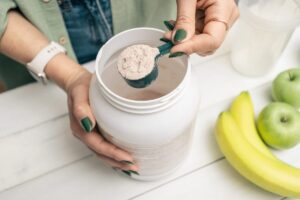What is the best pre-gym snack?

Food and exercise go hand in hand. What we choose to eat before (and after) going to the gym or working out at home can play a crucial role in our performance and the overall effectiveness of our workouts.
Many gym-goers incorporate pre-gym snacks into their meticulously thought-out meal plans to ensure their time in the kitchen supports their time spent in the gym and vice versa.
Similarly, if you’re a personal trainer, it’s likely you’ll recommend certain foods and eating habits to your clients as part of their training with you. And of course, you’ll want to practice what you preach, too.
In this blog, we’ll look at some of the best pre-gym snacks to have before your next workout, as well as some of the foods that are generally better to avoid.
First, though, we’ll look at how best to time your pre-gym snack and some of the main benefits of having one.
To skip straight to our list, click here.
What are the benefits of having a pre-gym snack?
Grabbing a quick snack before the gym has several benefits—some of them obvious, others less so.
You’ll have more energy
Food gives us energy, which you’re going to need in the gym, particularly if you’ve got a long or intense workout planned.
You’ll perform better
Lots of evidence suggests that having a pre-gym snack can improve your performance. Eating the right foods can stabilise your blood sugar levels and boost dopamine, which can improve your focus while exercising.
You’ll recover quicker
Getting the right nutrients on board before working out not only helps performance but recovery, too. Food can help reduce muscle damage and fatigue through exercise, meaning you won’t be quite as rigid the following day. It’ll also mean you’re less likely to get injured.
How long before exercise should you eat?

While it’s important to ensure your body is properly fuelled for the exercise you’re about to do, timing and planning your pre-gym snacks is also crucial. Eating the wrong thing at the wrong time could upset your stomach and cause issues while training, and nobody wants that.
3-4 hours before
This is the best time to eat a balanced meal before exercise, as 3-4 hours is plenty of time for food to digest. Make sure you get a balance of protein, healthy fats, and complex carbohydrates. The latter take longer to digest and will provide sustained energy while exercising later on.
The classic chicken, rice, and vegetables combo is a common choice here. Adding some sliced avocado is a good way of getting some healthy fats in, too.
1-2 hours before
Lighter meals can be consumed up to two hours before your gym session. Fats are not as important this close to your workout, but make sure you get a good intake of carbohydrates and protein.
30 mins before
Of course, you won’t want anything too heavy just before exercising, but this is the ideal time for a quick and healthy pre-gym snack. Focus on easy-to-digest carbs and avoid foods high in fibre, as too much fibre can promote bloating and gas and cause discomfort while exercising.
So, what are the best pre-gym snacks?
Sliced apple or banana with peanut butter

Sliced apple with peanut butter (crunchy or smooth,
depending on your preference) is a good pre-gym snack as it provides a nice
combination of carbohydrates, protein, and healthy fats.
Apples are a good, healthy source of energy due to their
carbohydrate and natural sugar content. Meanwhile, peanut butter is a quick and
easy source of protein and healthy fats.
Apples also typically have a lower glycemic index than most other fruits, so they don’t cause as much of a spike in your blood sugar before exercising.
If you’re not a fan of apples, bananas also pair well with peanut butter. Bananas are not only an additional source of carbohydrates, but potassium, too, which can help prevent muscle cramps.
Porridge

Porridge contains complex carbohydrates which burn slowly to
provide energy for several hours after consumption. This is why it’s such a
popular breakfast choice, as it helps to keep you fuller for longer.
But porridge’s slow energy release also makes it a great pre-gym snack—so if you’re working out mid-morning, simply have a bowl for breakfast!
One of the best things about porridge is that you can ‘customise’ it in any way you like, adding toppings and other supplements (e.g., protein powder) that can also aid your exercise performance. Try topping your porridge with nuts, fruit, or honey. Not only will this add to the taste, but it can also give you that little bit extra in the gym.
Wholegrain toast or bagel

For those who like a slice or two of toast, try having wholegrain
bread before a workout. Like porridge, wholegrains are a source of complex
carbohydrates, which keep you fuller for longer and provide lasting energy.
On the other hand, white bread is a simple carbohydrate, which means it will provide a quick spike in energy but then fade away just as quickly—so, wholegrain toast or a bagel is a much more effective pre-gym snack.
Toast and bagels can also be prepared to your taste with both sweet and savoury options. Avocado is a great source of healthy fats and is a popular toast topping, while eggs are an excellent source of protein, too.
Pasta

For decades, pasta has been the go-to pre-match meal for
footballers and other pro sportspeople, and it’s not just because they
like the taste!
It’s because pasta is a good source of carbohydrates, which, as we already know, are what our muscles use as fuel during exercise. Pasta can also be a source of iron and Vitamin B.
Not to mention that pasta is a highly versatile food, coming
in all sorts of shapes and sizes. It can also be paired with many other foods,
such as meat, fish, and vegetables—so you’re bound to find a combo that works
for you.
However, eating too much pasta can cause bloating, so be mindful of your portion sizes and timings pre-workout.
Pitta bread and hummus

Hummus is made from chickpeas, which are a good source of
protein. Another key ingredient of hummus is olive oil, which is a great
healthy fat that’s incredibly easy to include in your diet.
The carbohydrates from wholegrain pitta bread will also
provide a steady release of energy while you’re in the gym.
Hummus is also great with cucumber, carrot sticks or celery if you prefer something lighter than bread.
Protein bars and shakes

Protein bars and shakes are a great pre-gym snack to have,
and the clue as to why is in the name. The average protein bar you’ll find on
the supermarket shelves contains between 10-20g of protein, which is an ideal
amount to consume around an hour or so before a workout.
This can support overall muscle performance and, depending on the carbohydrate content, can give you a healthy energy boost, too.
Protein bars and shakes are generally healthier energy
sources than things like chocolate bars and energy drinks, for example, which
are usually laden with sugar.
They can also be easily made at home using protein powder, with a variety of flavours available.
Related: 7 ways to make protein shakes taste better
Greek yoghurt with dried fruit and honey

Greek yoghurt contains casein and whey proteins, both of which help boost muscle growth and recovery, making it ideal
as a quick snack before exercise.
Topping your yoghurt with dried fruit and honey not only
enhances the taste but will also give you a good energy boost through the
natural sugars and carbohydrates.
Be sensible with your yoghurt portion, though. Consuming too much dairy before exercise can make you gassy and lethargic.
Omelette

As we mentioned earlier on, eggs are an excellent source of
protein, so an omelette is a great choice before a workout.
Eggs contain all nine essential amino acids, which are essentially the building blocks of protein. They are also rich in several other nutrients and vitamins, so there are numerous benefits to including them in your diet.
Omelettes are cheap and quick to make and can be served with a light side salad or a portion of vegetables for extra nutrients.
Foods to avoid before the gym
Some types of foods are
generally better to avoid when it comes to your pre-gym snack. These include:
Foods particularly high in fibre: high-fibre foods take longer to digest and can lead to bloating and stomach cramps if consumed too close to a workoutSpicy foods: these foods can lead to indigestion, heartburn and cramping while exercisingFried food: fried food is usually high in saturated fat, which can make you feel bloated, tired and sluggish.
Whatever your go-to pre-gym snack, you may want to consider protecting yourself with specialist gym member insurance if you’re a regular gym-goer.
As with most sports and exercise regimes, going to
the gym comes with its risk of accident and injury, which could not only stop
you from exercising but also impact on your ability to work, too.
With specialist gym member insurance through Insure4Sport, you can opt for Personal Accident and Loss of Earnings cover to help deal with the financial repercussions of unexpected events in the gym.
Learn more about how we can help, and get a quote online today.






